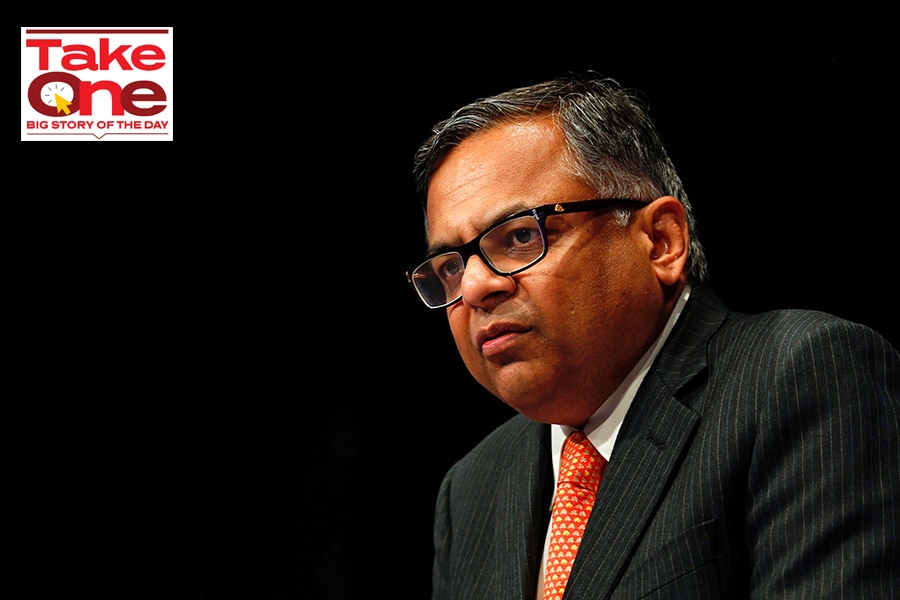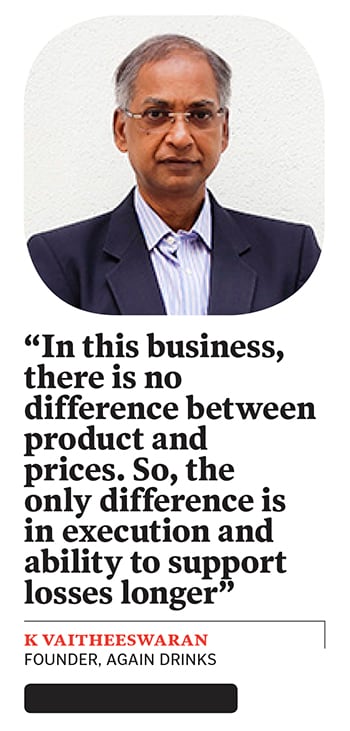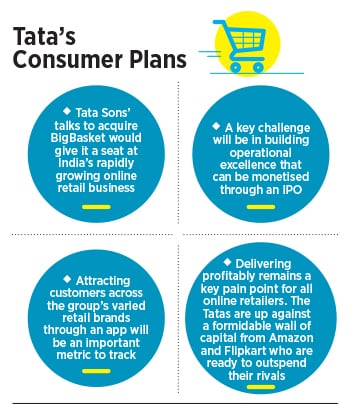
Tatas' (Second) Retail Tryst
As Tata Sons puts in place plans for an aggressive retail rollout, it would also need to put in place firm guardrails
 N Chandrasekaran, Chairman of the Board of Tata Sons; Image: REUTERS/Danish Siddiqui
N Chandrasekaran, Chairman of the Board of Tata Sons; Image: REUTERS/Danish Siddiqui
A necessary purchase. A repeat purchase. An essential purchase. Combine these three and it’s not hard to see why retail businesses make a bold promise. Get a critical mass of consumers (and their data), persuade them to buy regularly and a 25-to-50-percent-a-year growth for the next decade is there for the taking. Few businesses hold such potential.
The latest to be snared into retail’s charms is the 153-year-old Tata Group which plans to make retail businesses and the consumer a key ingredient of its growth strategy over the next decade. It promises steady growth with stable cash flows and, if executed well, a high price-to-earnings multiple. Within Bombay House, work on an app to link all of Tata’s consumer brands is being put in place. Also on the cards, according to media reports, are plans to buy out online grocer BigBasket and pharmacy e-retailer 1mg. In the absence of the deal not going through, an entry into grocery retail is still on the cards, but an organic rollout would take longer to execute.
A large part of Tata Sons’ earnings come from businesses that are cyclical. While Tata Steel and Tata Motors gorge out disproportionate amounts of cash in an upcycle, a downcycle is equally brutal. Both require long investment cycles. In contrast, once consumers are hooked, retail has the potential to generate high returns with low incremental capital. Given this it’s hardly surprising that N Chandrasekaran, who took over as chairman of Tata Sons in February 2017, has chosen to keep the consumer at the core of his new businesses.
India’s retail market is valued at $700 billion, according to the Boston Consulting Group, with organised retail—of which online retail is a subset—accounting for 10 percent and growing at 10 to 12 percent a year. Package-carrying delivery boys have become part of the urban landscape. “What excites the market now is the heavy overlay of tech in these businesses,” says Krishnan Thyagarajan, president and COO of DataWeave, a company that works on data analytics with retailers. According to him, the Tatas have no option but to take a seat at the table.
Also, in the last year, Reliance Industries [owner of Network 18, the publisher of Forbes India] had seen its valuation surge as it leveraged the strength of its telecom and retail consumers. The two businesses saw investments of Rs 152,056 crore and Rs 47,265 crore respectively, taking Reliance’s valuation to Rs 12 lakh crore. This, say industry watchers, prompted the Tatas to consider taking a seat at the table. If all works according to plan, the Indian online retail industry could coalesce around Reliance, Amazon, Walmart and the Tatas.





 Industry veterans Forbes India spoke to say they were disappointed that a potential BigBasket deal was being spoken about at a 1 to 1.2 times multiple to sales. It implies a distress valuation. “Look at the delivery companies quoting such high multiples. The low BigBasket multiple is an implicit admission of the fact that the buyer will have to burn capital for many years to come,” says a former employee of a grocery retailer. He estimates an annual cash burn of as much as Rs 2,000 to Rs 2,500 crore for BigBasket on account of its national network.
Industry veterans Forbes India spoke to say they were disappointed that a potential BigBasket deal was being spoken about at a 1 to 1.2 times multiple to sales. It implies a distress valuation. “Look at the delivery companies quoting such high multiples. The low BigBasket multiple is an implicit admission of the fact that the buyer will have to burn capital for many years to come,” says a former employee of a grocery retailer. He estimates an annual cash burn of as much as Rs 2,000 to Rs 2,500 crore for BigBasket on account of its national network.




